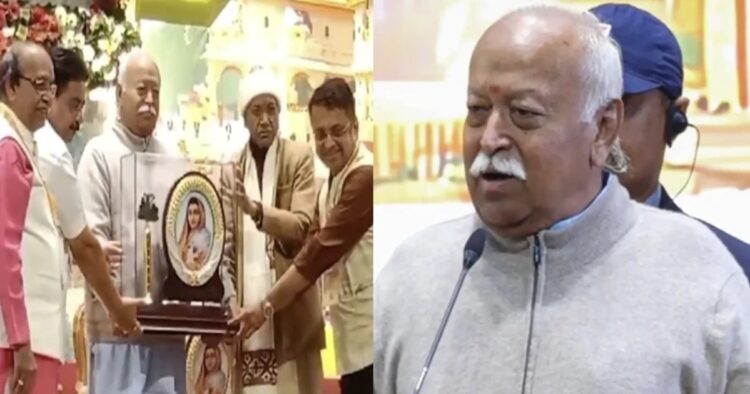The prestigious Devi Ahilya National Award was conferred upon Shri Champat Rai, Vice President of the Vishva Hindu Parishad (VHP) and General Secretary of the Shri Ram Janmabhoomi Teerth Kshetra. The award ceremony was held in Indore and graced by Rashtriya Swayamsevak Sangh (RSS) Sarsanghchalak Dr Mohan Bhagwat, who delivered a compelling address linking the Ram Mandir movement to the ideals of self-awakening and national resurgence.
In his address, Dr Bhagwat emphasised that the Ram Janmabhoomi movement was never about opposition or division but a “Yagya” aimed at the spiritual self-awakening of Bharat. “Ram, Krishna, and Shiva are the soul of Bharat. Shiva exists in every particle of this nation,” he declared. Referring to the long-standing struggle for the construction of the Ram Mandir in Ayodhya, he acknowledged the obstacles posed by certain forces, stating that the movement was a battle for Bharat’s identity and consciousness.
Dr Bhagwat recalled being questioned by students during the movement about prioritising the Mandir over livelihood issues. He responded that the Ram Mandir symbolised Bharat’s deeper spiritual and cultural aspirations. “The Mandir in Ayodhya has been built; now, it is time to build it in the hearts of people,” he said. Drawing a parallel between the governance of Devi Ahilyabai Holkar and the concept of Ram Rajya, he lauded the late queen’s vision and administration.
Accepting the award, Champat Rai dedicated it to all those who contributed to the decades-long Ram Janmabhoomi movement. Hailing from Bijnor, Uttar Pradesh, Rai has been a pivotal figure in the movement. He noted that the liberation of Ayodhya, Mathura, and Kashi was first raised by Congress MP Dau Dayal in 1983 before gaining momentum. “Seventy-five wars were fought for the Ram Janmabhoomi,” Rai remarked, highlighting the movement’s historical significance.
Former Lok Sabha Speaker Sumitra Mahajan, president of the Shri Ahilyotsav Samiti, reflected on the evolution of the Devi Ahilyabai festival. “Before 1995, the celebrations were modest. As Devi Ahilyabai’s legacy grew, so did the scale of the festival,” she said.

















Comments